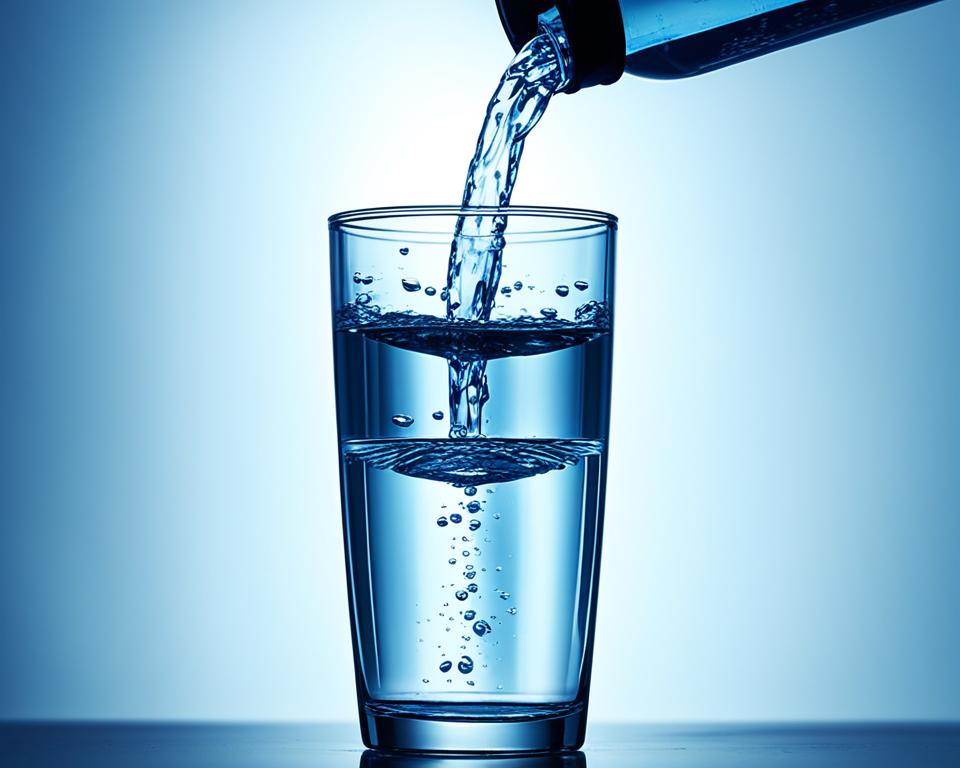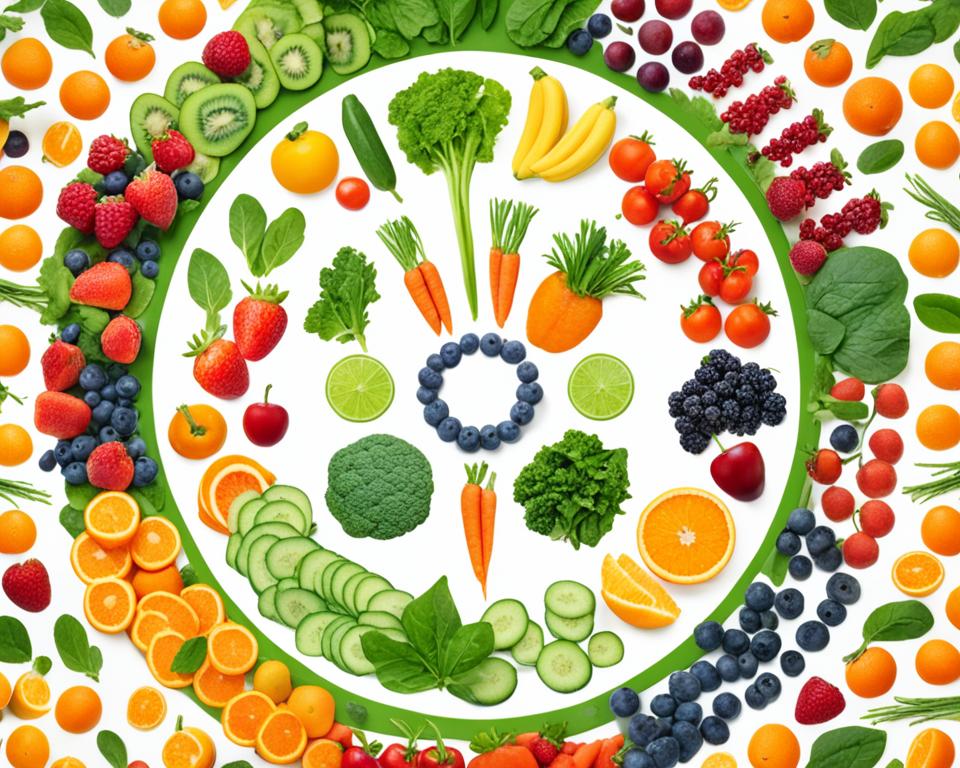For people with hypothyroidism, staying hydrated is key. The right water can boost thyroid health and overall health. This guide looks at the top water options for thyroid function. It also covers the special needs and tips for hypothyroidism.
We’ll talk about alkaline water, mineral water, filtered water, and purified water. You’ll learn about their pros and cons. This helps you choose the best hydration plan for managing hypothyroidism. We’ll also look at water quality and give drinking water recommendations. These tips will keep you hydrated and support your thyroid health.
Read more interesting information at ::kamarqgroup
Introduction to Hydration and Hypothyroidism
For people with hypothyroidism, staying hydrated is key. The thyroid gland helps balance the body’s water levels. Drinking enough water keeps the thyroid working right, which is important for making thyroid hormones.
Knowing how hydration and thyroid health connect helps find the best water for managing hypothyroidism.
Why Proper Hydration Matters for Thyroid Health
The thyroid gland makes hormones that control many body processes, like water and electrolyte balance. With hypothyroidism, keeping hydrated can be harder. Not drinking enough water can make hypothyroidism symptoms worse.
This shows why hydration for hypothyroidism is so important.
Understanding the Role of Water in Thyroid Function
Water is key for the thyroid gland to work well. It helps make and spread thyroid hormones and control metabolism. Good water quality and hydration support thyroid health, letting it do its job.
“Proper hydration is essential for individuals with hypothyroidism, as the thyroid gland plays a crucial role in regulating the body’s water balance.”
Exploring the Different Types of Water
Tap Water: Pros and Cons for Hypothyroidism
Choosing the right water is key for those with hypothyroidism. Tap water is a common choice but has its good and bad points. People with thyroid issues should think about these aspects.
Tap water is easy to get and keeps you hydrated. It’s often found in homes. Some tap water also has iodine, which helps the thyroid work better.
But, tap water quality changes a lot based on where you live. Tap water hypothyroidism is a worry because it might have things like chlorine, fluoride, or heavy metals. These can mess with thyroid hormones. Water quality hypothyroidism is something to keep in mind when drinking tap water.
To make sure tap water is safe for hypothyroidism, test it for contaminants. This can show if you need to filter or treat the water first.
| Pros of Tap Water | Cons of Tap Water |
|---|---|
|
|
Knowing the good and bad of tap water helps people with hypothyroidism pick the best water for their health.
Bottled Water: A Closer Look
For people with hypothyroidism, the quality of the water they drink is key. Bottled water is a common choice, but it’s important to check if it’s right for those with thyroid issues.
Bottled water can be very different in what it contains and how pure it is. This is especially true for those with bottled water hypothyroidism. Some bottled waters have lots of minerals, while others might have harmful substances. It’s vital to know about water quality hypothyroidism to choose wisely.
Evaluating Bottled Water Purity
Not every bottled water is the same. Some go through a lot of filtering to remove bad stuff, while others don’t. It’s smart to look into the brand and where the water comes from. This helps make sure it’s safe for you.
- Free from heavy metals, such as lead and mercury, which can mess with thyroid hormone production.
- Without chlorine and other byproducts of disinfection that can upset the thyroid’s balance.
- Has low levels of fluoride, as too much can stop iodine from being absorbed, which is important for thyroid health.
Looking closely at the bottled water’s makeup helps people with hypothyroidism pick the best one for them.
Balancing Mineral Content
The minerals in bottled water are also important. Iodine and selenium are key for a healthy thyroid. But too little or too much of these can cause problems.
When picking a bottled water, aim for one with the right mix of minerals. This helps keep your thyroid in good shape.
“Choosing the right bottled water can make a big difference in managing hypothyroidism. It’s key to focus on purity and the right mix of minerals for your thyroid health.”
Alkaline Water Benefits for Hypothyroidism
Alkaline water is getting more attention for its possible benefits, especially for hypothyroidism. It has unique properties that can help those with hypothyroidism. By learning about alkaline water, people with hypothyroidism can decide if it’s right for them.
Understanding the pH Balance of Alkaline Water
Alkaline water has a higher pH level than regular tap water. The pH scale goes from 0 to 14, with 7 being neutral. Alkaline water’s pH is between 8 and 9, making it more alkaline. This balance could be good for thyroid health.
Potential Benefits of Alkaline Water for Thyroid Health
Alkaline water benefits hypothyroidism by helping keep a healthy pH balance hypothyroidism. Hypothyroidism means the thyroid gland doesn’t make enough hormones. Alkaline water might balance the body’s acidity, supporting thyroid health.
Alkaline water also has minerals like calcium, magnesium, and potassium. These are important for the thyroid to work right. Getting enough minerals can help with thyroid hormone production, which is good for hypothyroidism.
Even though alkaline water could be good for hypothyroidism, we need more studies. People with hypothyroidism should talk to their doctor before trying it.
Mineral Water: A Hydrating and Nutrient-Rich Option
For people with hypothyroidism, staying hydrated is key. Mineral water is a great choice. It’s full of essential minerals that help your thyroid work better and keep you healthy. Let’s look at how certain minerals help your thyroid and why mineral water is good for you.
Essential Minerals for Thyroid Function
Your thyroid gland needs a balance of minerals to work right. Important minerals help make and regulate thyroid hormones. These are crucial for your metabolism and energy.
- Iodine – Key for making thyroid hormones, which control your metabolism and energy.
- Selenium – Helps turn thyroid hormones into active forms your body can use.
- Zinc – Helps enzymes that make and change thyroid hormones work right.
- Copper – Keeps thyroid hormone levels in check and changes one hormone to another.
Mineral water is full of these important minerals. It’s a good choice for people with mineral water hypothyroidism. It can help fix mineral shortages and support hydration hypothyroidism and essential minerals thyroid health.
Adding mineral water to your daily routine makes sure you get the minerals your thyroid needs. This helps keep your thyroid working well and you feeling good.
Filtered Water: Removing Contaminants for Better Hydration
For those with hypothyroidism, the quality of the water you drink is key. Filtered water can be a great choice. It removes contaminants that could harm your thyroid health.
Types of Water Filters and Their Effectiveness
There are many types of water filters, each with its own strengths. It’s important to know how well they work before picking one.
- Reverse Osmosis (RO) Filters – These filters take out a lot of contaminants, like heavy metals and fluoride. They’re great for people with hypothyroidism.
- Activated Carbon Filters – These filters are good at removing chlorine and some heavy metals. They make the water taste better and safer.
- Whole-House Water Filters – These filters clean all the water in your home. They’re a good choice for keeping your whole family’s water safe.
| Filter Type | Contaminants Removed | Effectiveness for Hypothyroidism |
|---|---|---|
| Reverse Osmosis (RO) | Heavy metals, fluoride, TDS, chlorine, organic compounds | High |
| Activated Carbon | Chlorine, organic compounds, certain heavy metals | Moderate |
| Whole-House | Wide range of contaminants, including heavy metals, chlorine, and organic compounds | High |
Knowing what different water filters can do helps people with hypothyroidism choose the best water quality and filtered water for their health.

best water to drink for hypothyroidism
For people with hypothyroidism, the type of water they drink is key to their health. The best water should have the right minerals, pH balance, and no contaminants.
Minerals like iodine, selenium, and zinc are vital for thyroid health. Mineral-rich water, from springs or wells, is great because it has these nutrients.
Alkaline water is also good, with a pH above 7. It helps balance the body’s acidity, which can hurt thyroid function.
Experts say to drink at least 8 cups (64 ounces) of water a day for hypothyroidism. This keeps the body hydrated, which is key for thyroid health.
It’s also wise to avoid water with fluoride, chlorine, or heavy metals. These can mess with thyroid hormone production. Filtered water or purified water are good choices because they remove these bad substances.
In short, the best water for hypothyroidism is rich in minerals, has a balanced pH, and is clean. Choosing the right water can help support thyroid health and improve well-being.
Purified Water: A Safe Choice for Hypothyroidism?
Managing hypothyroidism means paying attention to the water you drink. Purified water is often seen as a clean choice. But, it might have some effects on thyroid health. Let’s look at the good and bad sides of purified water for thyroid health.
Purification methods like reverse osmosis and distillation take out many contaminants. This includes heavy metals, chlorine, and more. For people with purified water thyroid worries, this is good. It makes the water safer to drink.
But, water quality hypothyroidism is more complex. Purified water might lose important minerals. These minerals, like iodine, zinc, and selenium, are key for thyroid hormones. Without them, thyroid health could suffer.
| Mineral | Role in Thyroid Health |
|---|---|
| Iodine | Essential for the production of thyroid hormones |
| Zinc | Supports the conversion of thyroid hormones |
| Selenium | Protects the thyroid from oxidative stress |
To avoid missing out on these minerals, make sure to get them from food or supplements. This helps keep your thyroid healthy and your hormone levels balanced.
Choosing purified water for hypothyroidism should be talked over with your doctor. Think about your specific needs, water quality, and nutrition. This way, you can pick the best option for your thyroid care plan.
“Proper hydration is essential for optimal thyroid function, but the quality of the water you drink matters just as much.”
Water Quality: Factors to Consider
The quality of the water you drink is key to keeping your thyroid healthy. It’s important to know about contaminants and how they affect thyroid health, especially if you have hypothyroidism.
Understanding Water Contamination and Its Impact on Thyroid Health
Water can get contaminated from things like industrial waste, farm runoff, and natural minerals. This can lead to heavy metals like lead and mercury, and other substances like fluoride, chlorine, and nitrates. These can harm your thyroid, making hypothyroidism worse.
Studies show that certain substances in water can mess with your thyroid’s iodine use. This is important for making thyroid hormones. Things like perchlorate and PCBs can be harmful.
“Maintaining high-quality water is essential for individuals with hypothyroidism, as contaminants can impact the delicate balance of thyroid function.”
Also, fluoride in water can lead to hypothyroidism by stopping thyroid hormone production.

To keep your water safe for managing hypothyroidism, check the source and look for contaminants. Test your water often and use filters to reduce risks.
Drinking Water Recommendations for Hypothyroidism
Drinking enough water is key for people with hypothyroidism. The right amount and timing of water can help support thyroid function and health. We’ll look at how much water you should drink and the best ways to stay hydrated with hypothyroidism.
How Much Water Should You Drink?
The amount of water you should drink depends on your age, activity level, and health. Generally, aim for at least 8 cups (64 ounces) of water per day. You might need more if you’re active or live in a hot place.
Timing Your Water Intake for Optimal Hydration
- Spread your water intake throughout the day, rather than consuming it all at once.
- Aim to drink a glass of water first thing in the morning to rehydrate after sleep.
- Stay hydrated during meals by sipping water or herbal tea.
- Avoid drinking water immediately before or after taking thyroid medication, as it can interfere with absorption.
- Increase your water intake if you experience symptoms of dehydration, such as dry mouth, fatigue, or headaches.
Keeping proper hydration is crucial for people with hypothyroidism. It supports thyroid function and overall well-being. By following these water intake recommendations and timing your water intake right, you can stay hydrated and manage your hypothyroidism better.
Hydration Tips for Managing Hypothyroidism
Drinking enough water is key for people with hypothyroidism. There are many ways to stay hydrated and help manage this condition. Let’s look at some easy tips to increase your water intake and keep your thyroid healthy.
Stay Hydrated Throughout the Day
Try to drink water all day, not just in big gulps. Drinking water often helps keep your body hydrated. It also supports your thyroid.
Incorporate Water-Rich Foods
- Add water-rich fruits and veggies like cucumbers, watermelon, and leafy greens to your meals. These foods help with hydration and are good for your thyroid.
- Avoid drinks that dry you out, like coffee, alcohol, and sugary drinks. They can mess with your hydration levels.
Tailor Your Water Intake
Listen to what your body needs and adjust your water intake. Things like the weather, how active you are, and your meds can change how much water you need. Try different amounts to see what works best for you.
Stay Mindful of Hydration Cues
Notice when you’re getting dehydrated, like feeling tired, having a dry mouth, or headaches. Drink more water right away. Being hydrated can ease some hypothyroidism symptoms.
“Proper hydration is essential for maintaining optimal thyroid function and managing the symptoms of hypothyroidism.”
Use these tips every day to help manage your hypothyroidism and boost your health. Drinking enough water is a simple yet powerful way to support your thyroid.
Incorporating Water-Rich Foods into Your Diet
Drinking enough water is key for managing hypothyroidism. But, eating water-rich foods also helps with hydration and supports thyroid health. We’ll look at how adding these foods to your meals can help.
Water-rich foods help with hydration and are full of nutrients that support thyroid function. Adding variety to your meals with these foods can improve your body’s ability to make hormones and keep a healthy metabolism.
Hydrating Superfoods for Hypothyroidism
- Cucumbers – Containing over 95% water, cucumbers are a refreshing and hydrating addition to salads, sandwiches, and snacks.
- Watermelon – This juicy fruit is an excellent source of water and electrolytes, making it a perfect summertime hydrator.
- Tomatoes – With a high water content and nutrients like vitamin C and lycopene, tomatoes can support thyroid health.
- Bell peppers – Crunchy and water-rich, bell peppers provide a satisfying crunch while also supplying vitamin A and antioxidants.
- Zucchini – Versatile and hydrating, zucchini can be enjoyed raw, roasted, or incorporated into a variety of dishes.
Incorporating Water-Rich Foods into Your Meals
Here are some tips to get the most from water-rich foods:
- Start your day with a hydrating breakfast, such as a smoothie made with fruits and vegetables.
- Incorporate water-rich veggies like cucumbers, tomatoes, and bell peppers into your salads and sandwiches.
- Experiment with soups and stews that feature high-water-content ingredients like zucchini, melons, and leafy greens.
- Snack on hydrating fruits like watermelon, oranges, and grapefruit to boost your daily water intake.
- Opt for water-rich sides like steamed or roasted vegetables to accompany your main dishes.
Adding water-rich foods to your diet supports your hydration and helps your thyroid work well. A balanced diet with these foods is great for managing hypothyroidism.
Frequently Asked Questions About Water and Hypothyroidism
As you explore the link between water, hydration, and hypothyroidism, you might have many questions. We’ve gathered the most common questions to help you understand this key part of thyroid health better.
Is there a specific type of water that’s best for hypothyroidism?
There isn’t a single best water type for everyone with hypothyroidism. Yet, some types might be more helpful. Filtered, mineral, and alkaline water could support thyroid function and health. Always talk to your healthcare provider to find the best water for you, considering your needs and local water quality.
How much water should I drink with hypothyroidism?
The amount of water you should drink varies by age, gender, and how active you are. Generally, adults need 11.5 to 15.5 cups (2.7 to 3.7 liters) of fluids daily. But, those with hypothyroidism might need more or less water, depending on their condition. Your healthcare provider can guide you on the right amount for you.
Can water quality affect hypothyroidism?
Yes, the quality of your drinking water can affect your thyroid health. Things like fluoride, chlorine, and heavy metals can mess with thyroid hormone production and use. Using filters or choosing clean water sources can help manage hypothyroidism by avoiding these substances.
| Water Type | Potential Benefits for Hypothyroidism |
|---|---|
| Filtered Water | Removes contaminants that can disrupt thyroid function |
| Mineral Water | Provides essential minerals for thyroid health |
| Alkaline Water | May help balance pH levels and support thyroid function |
Remember, the best water for hypothyroidism can vary by your unique needs and health. Always check with your healthcare provider to find the right water options for you.
Conclusion
Choosing the right water is key when you have hypothyroidism. Knowing what water is best for you can help you stay healthy and manage your condition better. Using the best water to drink for hypothyroidism and staying well-hydrated is important for your thyroid health.
This guide has shown you the different types of water and how they can affect your thyroid. You’ve learned about tap water, alkaline water, mineral water, and purified water. Each type has its own benefits and things to consider. This knowledge helps you pick the right water for your needs and your thyroid health.
It’s crucial to drink enough water to manage hypothyroidism. Following the guidelines for water intake and eating foods with lots of water can help. This keeps your body nourished and your thyroid working well. With the right hydration and caring for yourself, you can improve your hypothyroidism and feel better.



